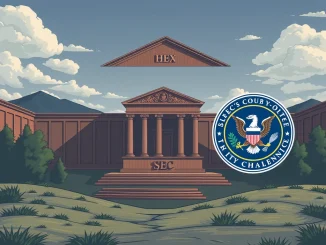
Hey there, crypto and finance fans! Get ready for some interesting news that could bridge the gap between traditional finance and the blockchain world. We’re talking about the latest move from Robinhood, the popular trading platform, and their significant Robinhood RWA proposal submitted to none other than the U.S. Securities and Exchange Commission (SEC). This isn’t just a minor tweak; it’s a call for a fundamental shift in how we view and regulate tokenized real-world assets (RWAs).
Why the Robinhood RWA Proposal Matters
Robinhood’s proposal centers on establishing a clear federal framework crypto assets representing real-world assets. Think stocks, bonds, real estate, or even fine art, but represented on a blockchain as a digital token. The core idea? These tokens should be treated legally just like the underlying assets they represent, not as complex derivatives or synthetic products that require entirely new, separate rulebooks.
This approach, if adopted by the RWA tokenization SEC discussions, could bring much-needed clarity and efficiency to the burgeoning RWA space. Imagine a world where owning a token representing a share of stock is legally the same as owning the traditional stock certificate (or its digital equivalent). No more redundant systems, no more legal grey areas about ownership rights – just a streamlined, blockchain-powered process.
Key Aspects of the Proposal
So, what exactly is Robinhood asking for? Here are some key takeaways:
- Legal Parity: Tokenized assets should have the same legal standing as their non-tokenized counterparts. A token representing a bond is legally a bond.
- Avoiding Derivatives: Don’t force tokenized assets into the box of derivatives or synthetic products, which often carry different regulatory burdens and complexities.
- Streamlined Systems: Treating tokens like underlying assets eliminates the need to build entirely new, separate compliance and operational systems solely for the tokenized version.
- Clarified Ownership: The proposal aims to make ownership rights for tokenized assets as clear and unambiguous as they are for traditional assets.
- Enabling Broker-Dealers: This framework would allow existing broker-dealer regulation structures, like those Robinhood operates under, to manage and trade tokenized assets more easily within established rules.
This move by Robinhood highlights the growing interest and potential in tokenizing assets beyond traditional cryptocurrencies. It acknowledges the power of blockchain technology to create more efficient, transparent, and accessible markets for a wide range of assets.
What’s Next for RWA Tokenization SEC Discussions?
This proposal is just the beginning. It’s now in the hands of the SEC, a body that has often approached crypto regulation with caution. However, focusing on RWAs within existing legal definitions could be a more palatable path forward for regulators compared to entirely new digital asset classes.
The potential benefits of a clear federal framework for tokenized real-world assets are significant:
- Increased Liquidity: Tokenization can make traditionally illiquid assets (like real estate) easier to buy and sell.
- Fractional Ownership: Allows multiple investors to own a piece of a high-value asset.
- Reduced Costs: Can potentially lower transaction fees and administrative overhead.
- Enhanced Transparency: Blockchain’s inherent transparency can provide clearer ownership records.
- Broader Access: Makes investment opportunities more accessible to a wider range of investors.
Of course, challenges remain, including ensuring robust security, interoperability between different blockchain platforms, and gaining widespread regulatory acceptance. But Robinhood’s Robinhood RWA proposal is a concrete step towards addressing the regulatory piece of the puzzle.
Conclusion: A Step Towards Integrated Finance?
Robinhood’s submission to the SEC marks a crucial moment in the conversation around RWA tokenization SEC engagement. By proposing a framework that leverages existing broker-dealer regulation and legal definitions, they are advocating for a path that could accelerate the adoption of tokenized real-world assets within regulated financial markets. This isn’t just about crypto; it’s about the potential for blockchain technology to transform traditional finance, making it more efficient, accessible, and transparent under a clear federal framework crypto umbrella that respects the nature of the underlying assets. Keep an eye on how the SEC responds – it could shape the future of finance.



